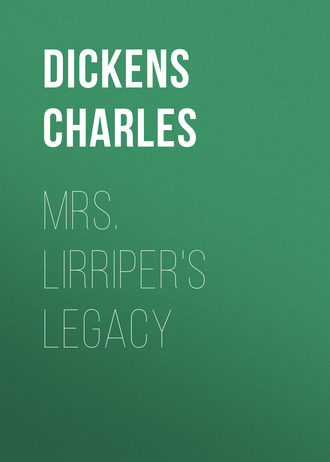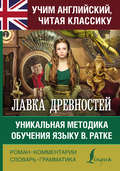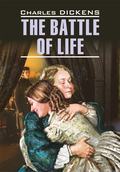
Чарльз Диккенс
Mrs. Lirriper's Legacy
It doesn’t signify a bit what a talkative old body like me said to Miss Wozenham when she said that, and so I’ll tell you instead my dear that I’d have given thirty shillings to have taken her over to tea, only I durstn’t on account of the Major. Not you see but what I knew I could draw the Major out like thread and wind him round my finger on most subjects and perhaps even on that if I was to set myself to it, but him and me had so often belied Miss Wozenham to one another that I was shamefaced, and I knew she had offended his pride and never mine, and likewise I felt timid that that Rairyganoo girl might make things awkward. So I says “My dear if you could give me a cup of tea to clear my muddle of a head I should better understand your affairs.” And we had the tea and the affairs too and after all it was but forty pound, and – There! she’s as industrious and straight a creeter as ever lived and has paid back half of it already, and where’s the use of saying more, particularly when it ain’t the point? For the point is that when she was a kissing my hands and holding them in hers and kissing them again and blessing blessing blessing, I cheered up at last and I says “Why what a waddling old goose I have been my dear to take you for something so very different!” “Ah but I too” says she “how have I mistaken you!” “Come for goodness’ sake tell me” I says “what you thought of me?” “O” says she “I thought you had no feeling for such a hard hand-to-mouth life as mine, and were rolling in affluence.” I says shaking my sides (and very glad to do it for I had been a choking quite long enough) “Only look at my figure my dear and give me your opinion whether if I was in affluence I should be likely to roll in it?” That did it? We got as merry as grigs (whatever they are, if you happen to know my dear —I don’t) and I went home to my blessed home as happy and as thankful as could be. But before I make an end of it, think even of my having misunderstood the Major! Yes! For next forenoon the Major came into my little room with his brushed hat in his hand and he begins “My dearest madam – ” and then put his face in his hat as if he had just come into church. As I sat all in a maze he came out of his hat and began again. “My esteemed and beloved friend – ” and then went into his hat again. “Major,” I cries out frightened “has anything happened to our darling boy?” “No, no, no” says the Major “but Miss Wozenham has been here this morning to make her excuses to me, and by the Lord I can’t get over what she told me.” “Hoity toity, Major,” I says “you don’t know yet that I was afraid of you last night and didn’t think half as well of you as I ought! So come out of church Major and forgive me like a dear old friend and I’ll never do so any more.” And I leave you to judge my dear whether I ever did or will. And how affecting to think of Miss Wozenham out of her small income and her losses doing so much for her poor old father, and keeping a brother that had had the misfortune to soften his brain against the hard mathematics as neat as a new pin in the three back represented to lodgers as a lumber-room and consuming a whole shoulder of mutton whenever provided!
And now my dear I really am a going to tell you about my Legacy if you’re inclined to favour me with your attention, and I did fully intend to have come straight to it only one thing does so bring up another. It was the month of June and the day before Midsummer Day when my girl Winifred Madgers – she was what is termed a Plymouth Sister, and the Plymouth Brother that made away with her was quite right, for a tidier young woman for a wife never came into a house and afterwards called with the beautifullest Plymouth Twins – it was the day before Midsummer Day when Winifred Madgers comes and says to me “A gentleman from the Consul’s wishes particular to speak to Mrs. Lirriper.” If you’ll believe me my dear the Consols at the bank where I have a little matter for Jemmy got into my head, and I says “Good gracious I hope he ain’t had any dreadful fall!” Says Winifred “He don’t look as if he had ma’am.” And I says “Show him in.”
The gentleman came in dark and with his hair cropped what I should consider too close, and he says very polite “Madame Lirrwiper!” I says, “Yes sir. Take a chair.” “I come,” says he “frrwom the Frrwench Consul’s.” So I saw at once that it wasn’t the Bank of England. “We have rrweceived,” says the gentleman turning his r’s very curious and skilful, “frrwom the Mairrwie at Sens, a communication which I will have the honour to rrwead. Madame Lirrwiper understands Frrwench?” “O dear no sir!” says I. “Madame Lirriper don’t understand anything of the sort.” “It matters not,” says the gentleman, “I will trrwanslate.”
With that my dear the gentleman after reading something about a Department and a Marie (which Lord forgive me I supposed till the Major came home was Mary, and never was I more puzzled than to think how that young woman came to have so much to do with it) translated a lot with the most obliging pains, and it came to this: – That in the town of Sons in France an unknown Englishman lay a dying. That he was speechless and without motion. That in his lodging there was a gold watch and a purse containing such and such money and a trunk containing such and such clothes, but no passport and no papers, except that on his table was a pack of cards and that he had written in pencil on the back of the ace of hearts: “To the authorities. When I am dead, pray send what is left, as a last Legacy, to Mrs. Lirriper Eighty-one Norfolk Street Strand London.” When the gentleman had explained all this, which seemed to be drawn up much more methodical than I should have given the French credit for, not at that time knowing the nation, he put the document into my hand. And much the wiser I was for that you may be sure, except that it had the look of being made out upon grocery paper and was stamped all over with eagles.
“Does Madame Lirrwiper” says the gentleman “believe she rrwecognises her unfortunate compatrrwiot?”
You may imagine the flurry it put me into my dear to be talked to about my compatriots.
I says “Excuse me. Would you have the kindness sir to make your language as simple as you can?”
“This Englishman unhappy, at the point of death. This compatrrwiot afflicted,” says the gentleman.
“Thank you sir” I says “I understand you now. No sir I have not the least idea who this can be.”
“Has Madame Lirrwiper no son, no nephew, no godson, no frrwiend, no acquaintance of any kind in Frrwance?”
“To my certain knowledge” says I “no relation or friend, and to the best of my belief no acquaintance.”
“Pardon me. You take Locataires?” says the gentleman.
My dear fully believing he was offering me something with his obliging foreign manners, – snuff for anything I knew, – I gave a little bend of my head and I says if you’ll credit it, “No I thank you. I have not contracted the habit.”
The gentleman looks perplexed and says “Lodgers!”
“Oh!” says I laughing. “Bless the man! Why yes to be sure!”
“May it not be a former lodger?” says the gentleman. “Some lodger that you pardoned some rrwent? You have pardoned lodgers some rrwent?”
“Hem! It has happened sir” says I, “but I assure you I can call to mind no gentleman of that description that this is at all likely to be.”
In short my dear, we could make nothing of it, and the gentleman noted down what I said and went away. But he left me the paper of which he had two with him, and when the Major came in I says to the Major as I put it in his hand “Major here’s Old Moore’s Almanac with the hieroglyphic complete, for your opinion.”
It took the Major a little longer to read than I should have thought, judging from the copious flow with which he seemed to be gifted when attacking the organ-men, but at last he got through it, and stood a gazing at me in amazement.
“Major” I says “you’re paralysed.”
“Madam” says the Major, “Jemmy Jackman is doubled up.”
Now it did so happen that the Major had been out to get a little information about railroads and steamboats, as our boy was coming home for his Midsummer holidays next day and we were going to take him somewhere for a treat and a change. So while the Major stood a gazing it came into my head to say to him “Major I wish you’d go and look at some of your books and maps, and see whereabouts this same town of Sens is in France.”
The Major he roused himself and he went into the Parlours and he poked about a little, and he came back to me and he says, “Sens my dearest madam is seventy-odd miles south of Paris.”
With what I may truly call a desperate effort “Major,” I says “we’ll go there with our blessed boy.”
If ever the Major was beside himself it was at the thoughts of that journey. All day long he was like the wild man of the woods after meeting with an advertisement in the papers telling him something to his advantage, and early next morning hours before Jemmy could possibly come home he was outside in the street ready to call out to him that we was all a going to France. Young Rosycheeks you may believe was as wild as the Major, and they did carry on to that degree that I says “If you two children ain’t more orderly I’ll pack you both off to bed.” And then they fell to cleaning up the Major’s telescope to see France with, and went out and bought a leather bag with a snap to hang round Jemmy, and him to carry the money like a little Fortunatus with his purse.
If I hadn’t passed my word and raised their hopes, I doubt if I could have gone through with the undertaking but it was too late to go back now. So on the second day after Midsummer Day we went off by the morning mail. And when we came to the sea which I had never seen but once in my life and that when my poor Lirriper was courting me, the freshness of it and the deepness and the airiness and to think that it had been rolling ever since and that it was always a rolling and so few of us minding, made me feel quite serious. But I felt happy too and so did Jemmy and the Major and not much motion on the whole, though me with a swimming in the head and a sinking but able to take notice that the foreign insides appear to be constructed hollower than the English, leading to much more tremenjous noises when bad sailors.
But my dear the blueness and the lightness and the coloured look of everything and the very sentry-boxes striped and the shining rattling drums and the little soldiers with their waists and tidy gaiters, when we got across to the Continent – it made me feel as if I don’t know what – as if the atmosphere had been lifted off me. And as to lunch why bless you if I kept a man-cook and two kitchen-maids I couldn’t got it done for twice the money, and no injured young woman a glaring at you and grudging you and acknowledging your patronage by wishing that your food might choke you, but so civil and so hot and attentive and every way comfortable except Jemmy pouring wine down his throat by tumblers-full and me expecting to see him drop under the table.
And the way in which Jemmy spoke his French was a real charm. It was often wanted of him, for whenever anybody spoke a syllable to me I says “Non-comprenny, you’re very kind, but it’s no use – Now Jemmy!” and then Jemmy he fires away at ’em lovely, the only thing wanting in Jemmy’s French being as it appeared to me that he hardly ever understood a word of what they said to him which made it scarcely of the use it might have been though in other respects a perfect Native, and regarding the Major’s fluency I should have been of the opinion judging French by English that there might have been a greater choice of words in the language though still I must admit that if I hadn’t known him when he asked a military gentleman in a gray cloak what o’clock it was I should have took him for a Frenchman born.







